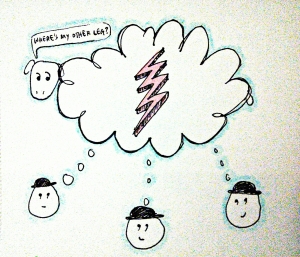This is a great “game” which can encourage students to access their creativity. It could be used as a quick warmer or a filler game at the end of class. Students can use any language they feel comfortable using, so it could be used with various levels. I think the game comes from a book of Surrealist Games which I don’t own but is certainly on my Christmas list.
You can tell the students that they are going to write some definitions and with any luck they can open their minds and plug into the psyche of the group, with some potentially interesting or revealing results. It’s a favourite travel activity of me and my games companion. Here are some examples of the sort of thing this game produces:
What is hair?
It’s a type of lid.
What is a tangent?
It’s a three-legged possibility.
What is turbulence?
It’s a basket of fish.
What is a nutcracker?
A series of shocks.
How to play? Well, for starters, everyone needs a paper and pen. The procedure is a bit like consequences, in that you write one line, fold it and pass it. So ask everyone to write a question at the top of the page. The question should be in the format What is…? eg. What is XXXX ? You could model it on the board first. (I recommend playing too: you as the teacher part of the group.)
Demonstrate to the class how to fold the paper back so that the question is hidden. It’s important that everyone does this the same way from the beginning otherwise someone will get in a right pickle.
Ask the class to pass their papers to their left-hand neighbour.
Now, here’s the difficult part. Impress on everyone that the idea isn’t to invent a definition; the idea is rather to let the definition come to your mind. When I play, I usually let my mind be empty and then wait to hear what sounds come in to my mind and from there the words come. I’m often surprised by what comes out. This is not something many people will be accustomed to doing, but you get better at it. We usually find that the first few definitions are off the mark but then we get some bizarrely relevant ones. Anyway, so you let a definition come to your mind, write it down and then fold it back and pass it.
At this stage you can decide to do one of two things: either everyone writes a new What is…? question and you continue repeating the steps above until the page is full, before unravelling the paper and reading the definitions, or you can stop at this point and read out the definitions at this point. I’d have to ask a surrealist engineer if there’s any benefit of doing this in terms of accessing the group psyche and I don’t know any. Whatever you do, have fun reading them out! Maybe you will find out something about your group!
I’ll finish with an example I quite like from my adult FCE group:
What is a laundry?
How I feel when I wake up in the morning without having sleep enough.
Possible variation: To practise speculation, you could specify that the definition must begin with As far as I know…, or It could be…, etc. If you have ideas for any other variations or extensions, please write them in the comments below!



[…] This is a great "game" which can encourage students to access their creativity. It could be used as a quick warmer or a filler game at the end of class. Students can use any language they feel com… […]
[…] This is a great "game" which can encourage students to access their creativity. It could be used as a quick warmer or a filler game at the end of class. Students can use any language they feel com… […]
[…] This is a great "game" which can encourage students to access their creativity. It could be used as a quick warmer or a filler game at the end of class. Students can use any language they feel com… […]
A lovely activity. Can’t wait to try it out.
I’ve tried it and, to be honest, it didn’t work as well as I thought it would. My advice is that you use it with very “imaginative” students. Mine could only come up with things like “I don’t know but I like it a lot”, and things like that…
Thanks for your comment, Isa, and sorry it didn’t go too well. It can be hard to tell with groups whether they’ll be good at using their imaginations or not! Maybe now they’ve tried it once, you could repeat the activity later in the year when they know each other better and feel more comfortable?
I just tried it yestrday and it really worked. Just be careful to stress that they are supposed to ask for a definition. I had some of my students writing down ´ What is your favourite food?´ 🙂 In the next class I explained a bit better and it worked like a charm. Thanks a lot!